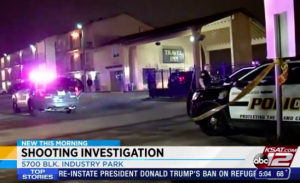
(KSAT 12)
Did a security lapse contribute to this San Antonio motel shooting?
Local News
A bystander was reportedly shot and injured outside of the Travel Inn motel in San Antonio Sunday, February 5, 2017.
According to MySA News, gunfire erupted “shortly before 9 p.m. Sunday outside the Travel Inn at 5710 Industry Park Drive.” An argument between a group of men apparently escalated in the motel parking lot.
“People staying at the motel eventually came out of their rooms due to the arguing and asked the men to leave,” KSAT 12 reports. “Following the argument one of the men drove back to the Travel Inn and started shooting at the guests still standing outside, hitting one of them.” The victim was transported to the hospital. His current condition has not been released.
The motel was apparently the subject of a prior shooting investigation in July 2011, per MySA reports.
Did negligent security contribute to the shooting of an innocent bystander? We represent individuals and families who have suffered a tragic loss or injury as a consequence of negligent property security. Read Our Legal Take to find out if the victim may have a legal avenue for justice and claims for substantial compensation in Texas, or call now for a free consultation with out legal team: 888.842.1616.
Our Legal Take
Generally, property owners are required to protect all guests legally on the premises from any foreseeable harm. Should the facts of this matter reveal that the motel owner or management failed to provide adequate security to protect those on its premises, the victim may seek justice and elect to pursue legal claims for his injuries.
Based upon its prior successful experience in handling security negligence claims on behalf of victims and their families, The Murray Law Firm suggests that photographs and a thorough, unbiased inspection of the property will need to be performed immediately, before any evidence may be repaired, damaged or destroyed. Given the complexities of pursuing a negligent security case, it is imperative that the victim retain an experienced attorney who can ensure the preservation of any and all evidence that may support such a claim.
We’ve Recovered Millions for Victims of Property Security Negligence…Contact us Now for a Free Consultation.

We represent our Clients on a contingency agreement, which generally means that no fees or payments are owed until and unless we recover. Anyone seeking further information or legal representation is encouraged to contact us via e-mail (click here) or by telephone at 888.842.1616. Consultations are free and confidential.
Choosing the Right Attorney
Selecting the right attorney for you or your family is highly important. You must feel confident that the attorney you hire has a complete understanding of the law applicable to your particular case, and has successful experience in handling such cases.
Important: Do not hire a lawyer who has violated the Rules of Professional Conduct!!!
You should not hire an attorney who calls you or visits you unsolicited, or anyone that contacts you directly to offer legal services. This activity is strictly prohibited by Rule 7.3 of the American Bar Association (ABA) Model Rules of Professional Conduct, which states as follows:
– RULE 7.3, ABA MODEL RULES OF PROFESSIONAL CONDUCT.
If an attorney, or someone acting on behalf of an attorney, contacts you in this manner, that attorney is in violation of this Rule. This unethical and unprofessional activity on the part of the lawyer is good sign that you should stay away. It is imperative that you are represented by an attorney who is capable of advocating for you within the confines of the law, and an attorney who fails to abide by the Rules of Professional Conduct is probably not the best fit. In fact, any such attorney should be immediately reported to the local State Bar Association. If you have been contacted in such an unsolicited manner, contact us and we’ll assist you in filing a report.
Contingency Fees Disclaimer: “Contingent attorneys’ fees refers only to those fees charged by attorneys for their legal services. Such fees are not permitted in all types of cases. Court costs and other additional expenses of legal action usually must be paid by the client.”

